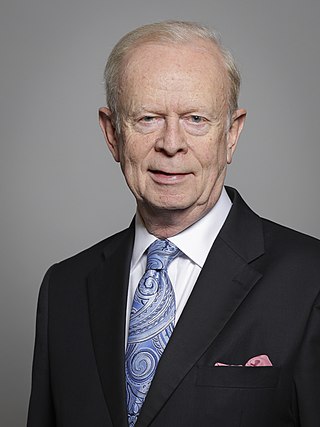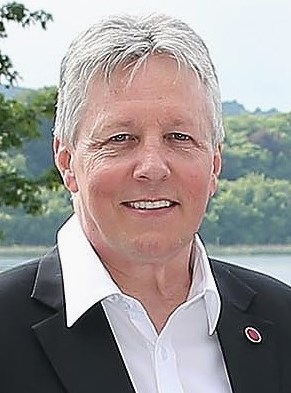
The politics of the United Kingdom functions within a constitutional monarchy where executive power is delegated by legislation and social conventions to a unitary parliamentary democracy. From this a hereditary monarch, currently Charles III, serves as head of state while the Prime Minister of the United Kingdom, currently Rishi Sunak since 2022, serves as the elected head of government.

The Ulster Unionist Party (UUP) is a unionist political party in Northern Ireland. The party was founded as the Ulster Unionist Council in 1905, emerging from the Irish Unionist Alliance in Ulster. Under Edward Carson, it led unionist opposition to the Irish Home Rule movement. Following the partition of Ireland, it was the governing party of Northern Ireland between 1921 and 1972. It was supported by most unionist voters throughout the conflict known as the Troubles, during which time it was often referred to as the Official Unionist Party (OUP).

The secretary of state for Northern Ireland, also referred to as the Northern Ireland secretary or SoSNI, is a secretary of state in the Government of the United Kingdom, with overall responsibility for the Northern Ireland Office. The incumbent is a member of the Cabinet of the United Kingdom.

The Northern Ireland Assembly, often referred to by the metonym Stormont, is the devolved legislature of Northern Ireland. It has power to legislate in a wide range of areas that are not explicitly reserved to the Parliament of the United Kingdom, and to appoint the Northern Ireland Executive. It sits at Parliament Buildings at Stormont in Belfast.
The Northern Ireland Executive is the devolved government of Northern Ireland, an administrative branch of the legislature – the Northern Ireland Assembly. It is answerable to the assembly and was initially established according to the terms of the Northern Ireland Act 1998, which followed the Good Friday Agreement. The executive is referred to in the legislation as the Executive Committee of the assembly and is an example of consociationalist ("power-sharing") government.
The Law Officers are the senior legal advisors to His Majesty's Government of the United Kingdom and devolved governments of Northern Ireland, Scotland and Wales. They are variously referred to as the Attorney General, Solicitor General, Lord Advocate, or Advocate General depending on seniority and geography - though other terms are also in use, such as the Counsel General for Wales. Law Officers in these roles are distinguished by being political appointees, while also being bound by the duties of independence, justice and confidentiality among the other typical professional commitments of lawyers. These roles do not have any direct oversight of prosecutions nor do they directly lead or influence criminal investigations. This is a distinguishing factor between Law Officers and the State Attorneys General of the United States or US Attorney General.

The Northern Ireland Office is a department of His Majesty's Government responsible for Northern Ireland affairs. The NIO is led by the Secretary of State for Northern Ireland and is based at Erskine House in Belfast City Centre and 1 Horse Guards Road in London.

Reginald Norman Morgan Empey, Baron Empey,, best known as Reg Empey, is a Unionist politician from Northern Ireland, who was the leader of the Ulster Unionist Party (UUP) from 2005 to 2010. He was the chairman of the Ulster Unionist Party from 2012 to 2019. Empey was also twice Lord Mayor of Belfast and was a Member of the Northern Ireland Assembly (MLA) for East Belfast from 1998 to 2011.

Arlene Isobel Foster, Baroness Foster of Aghadrumsee,, is a British broadcaster and former politician from Northern Ireland who served as First Minister of Northern Ireland from 2016 to 2017 and from 2020 to 2021. She was also leader of the Democratic Unionist Party (DUP) from 2015 to 2021. Foster was the first woman to hold either position. She is a Member of the House of Lords, having previously been a Member of the Legislative Assembly (MLA) for Fermanagh and South Tyrone from 2003 to 2021.
The St Andrews Agreement is an agreement between the British and Irish governments and Northern Ireland's political parties in relation to the devolution of power in the region. The agreement resulted from multi-party talks held in St Andrews in Fife, Scotland, from 11 to 13 October 2006, between the two governments and all the major parties in Northern Ireland, including the two largest, the Democratic Unionist Party (DUP) and Sinn Féin. It resulted in the restoration of the Northern Ireland Assembly, the formation of a new Northern Ireland Executive and a decision by Sinn Féin to support the Police Service of Northern Ireland, courts and rule of law.

The 2007 Northern Ireland Assembly election was held on Wednesday, 7 March 2007. It was the third election to take place since the devolved assembly was established in 1998. The election saw endorsement of the St Andrews Agreement and the two largest parties, the Democratic Unionist Party (DUP) and Sinn Féin, along with the Alliance Party, increase their support, with falls in support for the Ulster Unionist Party (UUP) and the Social Democratic and Labour Party (SDLP).
The Northern Ireland Conservatives is a section of the United Kingdom's Conservative Party that operates in Northern Ireland. The party won 0.03% of the vote in the 2022 Northern Ireland Assembly election and 0.7% of the vote in the 2019 United Kingdom General election in Northern Ireland.
The Executive Office is a devolved Northern Ireland government department in the Northern Ireland Executive with overall responsibility for the running of the Executive. The ministers with overall responsibility for the department are the First Minister and deputy First Minister.

The first minister and deputy first minister of Northern Ireland are the joint heads of government of Northern Ireland, leading the Northern Ireland Executive and with overall responsibility for the running of the Executive Office. Despite the titles of the two offices, the two positions have the same governmental power, resulting in a duumvirate; the deputy First Minister, customarily spelled with a lowercase d, is not subordinate to the First Minister. Created under the terms of the 1998 Good Friday Agreement, both were initially nominated and appointed by members of the Northern Ireland Assembly on a joint ticket by a cross-community vote, under consociational principles. That process was changed following the 2006 St Andrews Agreement, such that the First Minister now is nominated by the largest party overall, and the deputy First Minister is nominated by the largest party from the next largest community block.

The advocate general for Northern Ireland is the chief legal adviser to the Government of the United Kingdom on Northern Ireland law and the post is held by the attorney general for England and Wales by virtue of that office. The advocate general and the solicitor general for England and Wales have, in Northern Ireland, the same rights of audience as members of the Bar of Northern Ireland.
Events during the year 2010 in Northern Ireland.

In the United Kingdom, devolution is the Parliament of the United Kingdom's statutory granting of a greater level of self-government to the Scottish Parliament, the Senedd, the Northern Ireland Assembly and the London Assembly and to their associated executive bodies: the Scottish Government, the Welsh Government, the Northern Ireland Executive and in England, the Greater London Authority and combined authorities.

The 2010 United Kingdom general election in Northern Ireland occurred on 6 May 2010 and all 18 seats in Northern Ireland were contested. 1,169,184 people were eligible to vote, up 29,191 from the 2005 general election. 57.99% of eligible voters turned out, down 5.5 percentage points from the last general election.

New Decade, New Approach (NDNA) is a 9 January 2020 agreement which restored the government of the Northern Ireland Executive after a three-year hiatus triggered by the Renewable Heat Incentive scandal. It was negotiated by Secretary of State for Northern Ireland Julian Smith and Irish Tánaiste Simon Coveney.














